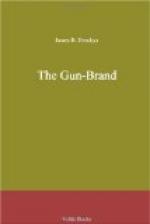The Indians dispersed and, slinging a rifle over his shoulder, MacNair swung off alone into the bush.
Bob MacNair knew the North; knew its lakes and its rivers, its forests and its treeless barrens. He knew its hardships, dangers and limitations, and he knew its gentler moods, its compensations, and its possibilities. Also, he knew its people, its savage primitive children who call it home, and its invaders—good and bad, and worse than bad. The men who infest the last frontier, pushing always northward for barter, or for the saving of souls.
He understood Pierre Lapierre, his motives and his methods. But the girl he did not understand, and her presence on the Yellow Knife disturbed him not a little. Had chance thrown her into the clutches of Lapierre? And had the man set about deliberately to use her school as an excuse for the establishment of a trading-post within easy reach of his Indians? MacNair was inclined to believe so—and the matter caused him grave concern. He foresaw trouble ahead, and a trouble that might easily involve the girl who, he felt, was entirely innocent of wrongdoing.
His jaw clamped hard as he swung on and on through the scrub. He had no particular objective, a problem faced him and, where other men would have sat down to work its solution, he walked.
In many things was Bob MacNair different from other men. Just and stern beyond his years, with a sternness that was firmness rather than severity; slow to anger, but once his anger was fairly aroused terrible in meting out his vengeance. Yet, withal, possessed of an understanding and a depth of sympathy, entirely unsuspected by himself, but which enshrined him in the hearts of his Indians, who, in all the world were the men and women who knew him.
Even his own father had not understood this son, who devoured books as ravenously as his dogs devoured salmon. Again and again he remonstrated with him for wasting his time when he might be working for the company. Always the younger man listened respectfully, and continued to read his books and to search for the lost mines with a determination and singleness of purpose that aroused the secret approbation of the old Scotchman, and the covert sneers and scoffings of others.
And then, after four years of fruitless search, at the base of a ridge that skirted the shore of an unmapped lake, he uncovered the mouth of an ancient tunnel with rough-hewn sides and a floor that sloped from the entrance. Imbedded in the slime on the bottom of a pool of stinking water, he found curious implements, rudely chipped from flint and slate, and a few of bone and walrus ivory. Odd-shaped, half-finished tools of hammered copper were strewn about the floor, and the walls were thickly coated with verdigris. Instead of the sharp ring of steel on stone, a dull thud followed the stroke of his pick, and its scars glowed with a red lustre in the flare of the smoking torches.




